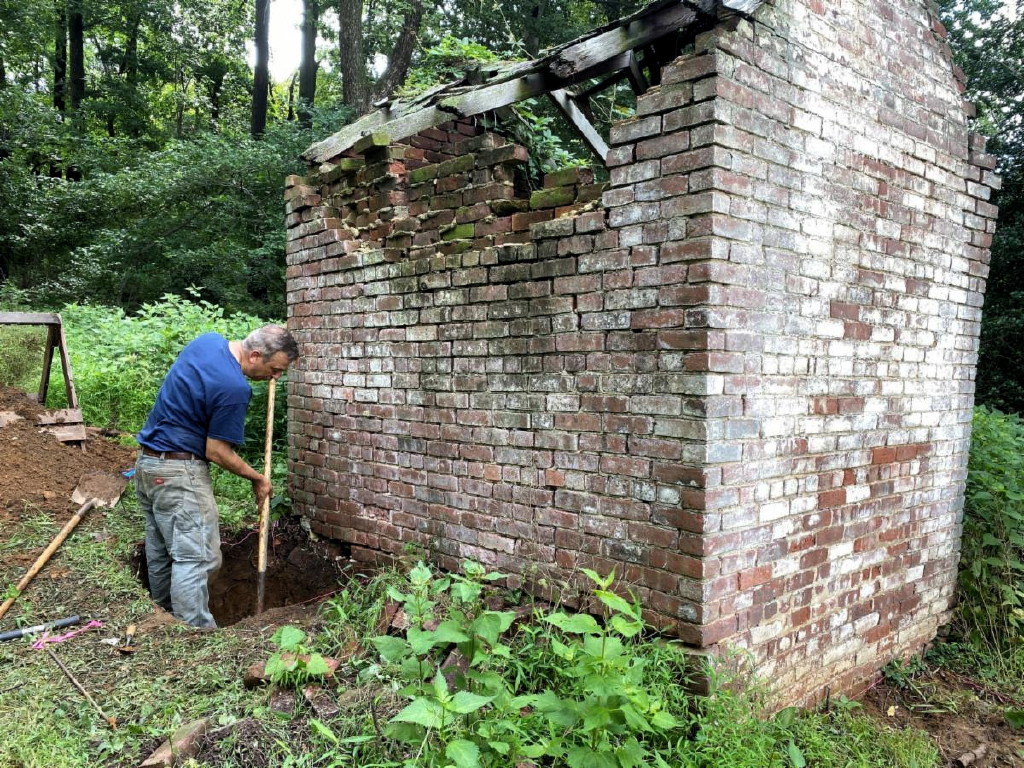Under a sweltering summer sun and the occasional thunderstorm, Richard and Douglas Veit spent a couple of days digging square pits alongside the remains of a 19th century smokehouse on the grounds of the Taylor-Butler House in Middletown.
The smokehouse, built into a small hillside just north of the grand Italianate mansion colloquially known as Orchard Home, was largely neglected when the Monmouth County Historical Association (MCHA) acquired the grounds in 1999, according to a press release from the association.
MCHA is planning to restore the smokehouse, once an integral part of the home’s domestic landscape, with grants from the 1772 Foundation, in cooperation with the New Jersey Historic Trust and the Monmouth County Historical Commission, according to the press release.
“Most 19th century smokehouses are long gone by now, so MCHA is fortunate to have this opportunity,” said Joe Zemla, MCHA’s associate curator. “We are very appreciative of the work done by Rich and Douglas Veit in helping us preserve this unique piece of history.”
In 1853, Joseph Dorset Taylor and his wife, Mary Holmes Taylor, left their New York home to return to the ancestral Taylor family farm, located on present-day King’s Highway in the Middletown Village Historic District. Here they built Orchard Home.
At the time of its construction, the Taylor residence was considered the finest in Middletown, graced with all the modern amenities of the pre-Civil War era, according to the press release.
Situated on acres of pristine orchard, the estate was equipped with a service courtyard, complete with an array of outbuildings such as an icehouse, a two-story privy, and a brick smokehouse, the latter being the traditional means of curing and storing meats prior to the advent of electric refrigeration.
“Restoring the smokehouse will give visitors insight into the day-to-day workings of the household and the lives of the servants employed by the Taylor family,” said Meg Sharp Walton, executive director of MCHA. “We are grateful to the 1772 Foundation and the Monmouth County Historical Commission for making the restoration possible.”
The test excavations at the base of the smokehouse were able to determine the foundation is indeed stable despite outward appearances, according to the press release.
As an added bonus, several 19th century artifacts were uncovered from the shovel pits, including shards of transfer-printed whiteware, cut nails, an animal rib, fragments of a glass inkwell, and the broken remains of a large glass bottle.
Richard Veit, a professor of anthropology and chair of the Department of History and Anthropology at Monmouth University, West Long Branch, and his son, Douglas Veit, made another intriguing discovery just a few yards from the smokehouse, where shovel tests confirmed the location of a former underground icehouse.
Prior to home refrigeration, outdoor icehouses were insulated with straw or sawdust to keep freshly cut river ice frozen throughout the warmer months. This structure was revealed to be much larger than previously estimated, with a diameter of roughly 20 feet.
Veit noted that the size of the icehouse at Orchard Home is unique, as it is uncharacteristic of others found in Monmouth County.
Although the Monmouth County Historical Association’s properties are currently closed due to the pandemic, visitors are welcome to visit the grounds of Orchard Home and MCHA’s other historic properties. Orchard Home is available to rent for private events. Visit MCHA’s website for rental information and for updates about reopening plans.

